Whether you’re a seasoned freelance writer or a beginner with no experience, freelance writing jobs are plentiful — if…
- You know where to look;
- You know how to promote yourself;
- And you know how to differentiate yourself from your fellow freelance writers.
And that’s where we come in.
If you’re a freelancer who wants to work at home and earn a full-time or part-time income doing what you love, this post will help you do just that.
Let’s dive in.
Get Your House in Order: Steps to Help You Prepare (and Land More Freelance Writing Gigs)
The philosopher Seneca (allegedly) said, “luck is what happens when practice meets opportunity.” The book of Galatians in the Bible tells us we reap what we sow.
Stephen King put it this way:
The common theme? Success tends to find those who are prepared for it.
As a writer, here are four things you should do to prepare for freelancing glory:
1. Create a Writing Portfolio That Kicks Butt
“Do you have writing samples?” “Can I see some of your writing work?” “What are some high-quality articles you’ve written?”
As a freelance writer, you’ll hear questions like these often.
And your answer?
At least, that should be your answer. But unfortunately, many freelancers skip the whole “prove you actually know how to write” thing.
As Scott Weiland once sang, “let the proof be in the pudding, sugar.”
Don’t simply tell prospective clients that you’re an amazing content writer. And don’t assume they already know you’re the cat’s meow and the bee’s knees.
Show them.
2. Supercharge Your Writing Skills
Unless you want to spend your writing career slumming through content mills with entry-level job ads that pay peanuts, you need to level up your content creation skills.
Because those high-paying freelance jobs you lay awake dreaming about? Companies don’t hand those to just anyone.
They give them to writers who:
- Realize the importance of SEO (and can create content with both readers and Google in mind);
- Understand the importance of proofreading and submitting error-free work;
- Write fast and meet deadlines;
- Craft amazing headlines, write with clarity, and support their points with examples;
- Can connect with readers on an emotional level.
The good news?
With hard work, anyone can improve their writing skills. And for the few who are willing to roll up their sleeves and do it, the payoff can be huge.
This site is filled with helpful how-to articles on copywriting, content writing, content marketing, and SEO. And if you need training, we have that too.
3. Ask for Testimonials
Landed a job or two? Awesome.
Did you ask the client to give you a testimonial? A few words declaring their undying love and/or satisfaction with your work (that you can use to help you land more clients)?
No? Well, you’re not alone.
Most writers who do freelance work, either due to ignorance or fear, don’t ask for testimonials. Our own Jon Morrow says he’s only had a small handful of writers over the years ask him for a testimonial — even though he would’ve been perfectly happy to give one to them.
So how should you ask for one? Keep it simple.
Here’s how Karen MacKenzie asked for a testimonial after we published her first post on Smart Blogger:
And because Karen did such a good job on her post, I was happy to give her the following testimonial:
Want a great testimonial like Karen’s?
Create testimonial-worthy content for your clients and then — this is key — ask them for a freakin’ testimonial.
4. Learn How to Craft a Killer Author Bio
Picture it:
A wealthy business owner sitting in a Herman Miller chair on top of a rug made out of recycled Herman Miller chairs is reading an article you’ve written.
She’s impressed. She calls to her butler, Jeeves, and asks him to bring one of her suitcases filled with money.
Your article is so good, she wants to hire you.
But then she gets to your byline — the one you threw together at the last minute. The one that lists your hobbies and has no clear call to action.
“Throw the suitcase in the fire, Jeeves,” she says. “I shan’t be hiring a writer today.”
If you don’t want this totally realistic scenario to happen to you, you need to get really good at writing author bios.
Why?
Because someone who’s made it to your author bio is primed. They’ve read your work and want to learn about the attractive, intelligent individual who wrote it.
Maybe they want to check out your website so they can read more of your work. Maybe they want to find you on social media so they can follow you.
Or maybe they want your contact info so they can hire you.
Pound the Pavement: Hacks for Finding Under-the-Radar Opportunities
Anyone can find a job board and search for online writing jobs. But that’s both a good and bad thing — anyone can do it.
That awesome job you found? The one you’d be perfect for? Fifty other “perfect” people found it too.
We’ll go over some great job board options in a moment (because they do have lots to offer freelance writers), but first we’ll take a trip down the road less traveled.
For example, did you know you could…
5. Use Twitter to Reverse-Engineer Writing Jobs
Want an outside-the-box way to find writing opportunities?
Try Twitter’s advanced search.
In the example below, I searched for tweets that included the phrase “writer wanted”:
I kept the search simple, but I could’ve also searched by language, hashtags, date range, and more. The more options you choose, the more refined your search results.
Click “Search” and you’ll see a list of tweets with various job postings for writers:
Scroll through the list and tweak your job search, as needed.
Some of the results will be scams, but most will be legitimate. Many will be for remote jobs, but some will be location specific (usually New York, Los Angeles, San Francisco, Miami, and other major cities in the United States). Just skip over the ones that don’t apply to you.
If you look at “Top” tweets, as shown in the screenshot above, you’ll find brand-new jobs mixed with older ones. Click “Latest” if you want to see recent tweets first.
The nice thing about Twitter’s advanced search feature is it’s only limited by your imagination.
Want to find guest blogging opportunities (since many websites these days pay for guest posts)? Enter “guest post” into the “this exact phrase” option and you’ll see every tweet written by someone looking to promote their latest guest blogging masterpiece.
That’ll give you a list of websites that accept guest posts, which you can later whittle down (after you’ve done a little more research) into a list of sites that pay guest writers.
Wash, rinse, and repeat.
6. Follow Leads on Social Media
When you use Twitter’s advanced search feature to find freelance writing jobs, you’ll discover certain Twitter handles pop up fairly frequently.
One example is @write_jobs:
When you find a good lead, follow them. That way you can cut through the noise of Twitter and go straight to your best sources.
Even better?
Add them to a private Twitter list so that tweets from all your leads can be found in one handy repository.
Here’s how you do it:
Here are a few more handles to get your Twitter list started:
7. Check Out Agency Job Postings
Everyone likes to talk about job boards (which, again, we’ll discuss in a moment). But you know what resource most freelance writers ignore?
Agencies.
Per Jon:
How to Become a Freelance Writer, Starting from Scratch
So how can you get work from agencies? Well, you could contact them directly and ask if they have any freelance work (Jon calls this a “gutsy but effective approach”).
The other way is to keep checking their “career” page:
The Content Marketing Institute maintains a detailed database of agencies. Click here to check it out.
8. Find (and Woo) Clients on Their Turf
Most articles that tout social media as a good place to find leads will point you to Facebook Groups.
And it makes sense. After all, search Facebook for “writing jobs”, click the “Groups” tab, and you’ll see dozens and dozens of options that are open to the public:
If you’re looking for a safe space where like minded individuals offer tips, advice, and writing war stories; such groups are great.
But if you’re looking to find paying gigs, you’ll likely be left wanting.
Most members of these groups are looking to be hired, not looking to hire someone. And when someone wanting to hire a writer does come along, the person who raises their hand first is usually the one who gets the job.
That’s not to say Facebook Groups can’t lead to writing jobs that pay. The trick is you need to find groups where the buyers, not the sellers, hang out.
Think “masterminds”, “think tanks”, etc.
Of course, that’s easier said than done. Such groups are usually private. So, what’s a writer to do?
Skip the Facebook Groups. Go Straight to the Sources.
One of the amazing things about technology is the way it allows us to connect and interact with people with whom we’d otherwise never have the opportunity.
In 2014, I didn’t know Adam Connell of Blogging Wizard. But I joined his mailing list and, lo and behold, a “welcome” email with his address arrived in my inbox. I responded, he wrote me back, and a friendship was born.
I first connected with Henneke Duistermaat of Enchanting Marketing through a humble blog comment. The same was true with Syed Balkhi. I connected with Pamela Wilson via Twitter. For Jon Morrow, the man who would one day hire me at Smart Blogger, I got on his radar by becoming a student in one of his courses.
Want to write for a mover and shaker in your industry? Want to befriend an influencer who can open doors for you (the kind of doors that lead to paying jobs)?
Make a connection. Be generous. Give without asking or expecting anything in return.
That means following them on Twitter, sharing their content, and interacting with them. It means subscribing to their email list.
And, yes, it may mean buying one of their products. Because here’s the thing:
When you’re their student, an influencer is invested in your future. Your success is their success. You’re a walking, talking testimonial. So many — not all, but many — will do everything they can to help you succeed.
And that includes pointing leads in your direction.
9. Pitch to Software Company Blogs
More from Jon:
Software companies with blogs tend to publish a lot of content. After all, every article they publish tends to pay for itself (and then some) thanks to the traffic it brings to the website — traffic that often leads to sales of their product.
As with agencies, you can either cold pitch the software companies (which sometimes works), or you can keep an eye out for open positions:
10. Don’t Be Scared of Ghostwriting
A lot of writers don’t like the idea of ghostwriting.
I get it. You’re letting someone else put their name on and take credit for your hard work.
Yes, that’s ghosting in a nutshell. But here’s the thing:
- Ghostwriting pays better than regular freelance writing. When you ghostwrite, it’s not unheard of to increase your fee by 15%-20% (or more).
- You can make great business relationships by ghostwriting. People who pay for ghostwriters tend to have money (and connections). Oftentimes, these clients can refer you to others.
If your primary goal is to build up a strong list of writing samples, ghostwriting isn’t for you.
But if your goal is making money and building potentially-profitable business relationships, it’s something to consider.
And here’s the best part:
Because so many freelance writers loathe ghostwriting, there isn’t as much competition.
Job Boards: The Low-Hanging Fruit (Packed with Opportunities)
Next up, let’s look at some popular (and some under-the-radar) job boards used by freelance writers all over the world.
If you’re new to freelancing, job boards will likely be your easiest entry point. Once you have some writing samples under your belt and you begin getting good referrals from clients, more opportunities will become available to you.
Let’s start with possibly the biggest one:
11. LinkedIn
If you’re a professional, there’s a good chance you already have a LinkedIn account (even if, like me, you tend to forget about it for months at a time).
Its job board, as you would expect from a site that specializes in professional networking, is huge.
How huge?
Well, at the time of this writing, there are over 32,000 job postings for “writer” alone:
Thankfully, LinkedIn offers lots of filters. Search by date, the job’s industry, the job type (full-time, part-time, etc.), experience level, and more.
If you’re already on LinkedIn, it’s a good place to start.
12. ProBlogger
As its name would suggest, ProBlogger’s Job Board is a popular one amongst bloggers in search of freelance writing work.
However, with a $70 starting price for posting a job, you tend to find smaller companies (and lower rates) on ProBlogger. There are exceptions, of course.
One neat feature offered by ProBlogger is a Candidate Database employers can search to find writers. It’s free for writers to join, and you can use it as an online resume and sales page.
13. Upwork
Depending on who you talk to, Upwork is either awful or amazing. And the funny thing is, the reasons for its awfulness and amazingness are one and the same: low rates.
Employers love Upwork because you can typically find qualified applicants who live in areas with lower cost of living. As a result, they can get great work at reduced costs.
Those who hate Upwork do so because they’re competing with the aforementioned applicants who can comfortably live on less money.
So what does this mean for freelance writers?
Unless you’re content with low rates (because you need the practice, you want to build up your portfolio, you need all the work you can get, etc.), you’re better off with one of the other job boards mentioned.
14. BloggingPro
BloggingPro requires clients to publish job ads that pay a minimum of $15 an hour (or have at least 500 words).
Job categories are blogging, content writing, copywriting, and journalism. And types of work include contract, freelance, full-time, part-time, internship, and temporary.
As job boards not named LinkedIn or Indeed go, it’s pretty detailed.
15. FlexJobs
FlexJobs specializes in all types of remote work. It isn’t free, but you get a lot for your money.
For starters, you’re safe from scams — each job posting is vetted by an actual human. You also don’t have to hunt for jobs that’ll allow you to work from home while wearing your pajamas — all job ads are for remote work. It’s kind of their thing.
Plans start at $14.95 per month. There’s a 30-day money-back guarantee, which means you can try it out, see if there are any promising writing jobs, and cancel if you don’t like what you see.
16. Freelance Writers Den
Founded by Carol Tice, the Freelance Writers Den is a paid membership site with a long track record.
Unlike most job boards, you also get bonuses. There are over 300 hours of training material, pitch examples, templates, and monthly live events.
Membership is $25 per month with no contract. You can cancel anytime and not pay the next month’s dues. There’s also a 7-day money-back guarantee when you first join.
17. Who Pays Writers?
According to its website, Who Pays Writers? is “an anonymous, crowd-sourced list of which publications pay freelance writers — and how much.”
Translation: Once you’re ready to write for a high-profile publication that’ll look amazing on your portfolio, Who Pays Writers? will be a helpful resource you can use to discover which publications accept applications (and how much they tend to pay per word).
It’s definitely one you should bookmark.
18. FreelanceWriting.com
Curating the best writing jobs that Indeed, Craigslist, BloggingPro, and others have to offer (as well as their own, exclusive writing opportunities); freelancewriting.com is a one-step resource for freelancers.
Not all job posts are for remote work, but you can filter the ads to fit your needs. Categories include blogging (WordPress, SEO, etc.), writing (copywriter, staff writer, short stories, etc.), proofreading (copy editor, proofreader, etc.), journalism, copywriting, social media (marketing manager, social media manager, etc.), and technical writer.
If you’d like to keep your list of job boards short, freelancewriting.com is a good one to keep on it.
19. Freelance Writing Jobs
Freelance Writing Jobs curates writing jobs from Craigslist, Indeed, Journalism Jobs, and others.
Every week day, Monday through Friday, they publish a short list of hand-picked job ads. So, if you prefer quality over quantity, it’s worth a bookmark.
20. Be a Freelance Blogger
Sophie Lizard’s job board keeps things pretty simple: if you want to publish a job ad on Be a Freelance Blogger, it has to pay at least $0.10 per word or $50 per post.
If you’re just starting out, it’s definitely worth looking into.
21. Journalism Jobs
If you want to target magazines and newspapers, Journalism Jobs is a great resource. With close to 3 million page views each month, it’s the largest resource for journalism jobs on the web.
So, if publications are your focus, it should be on your short list.
Ready to Become a Successful Freelance Writer?
There may be lots of writing jobs out there, but that doesn’t mean it’s easy out there.
Landing your first writing job is difficult. But, it does get easier the more you do it. I promise.
Like a Nicolas Cage movie marathon, once you survive the first few, you can handle pretty much anything.
With the tips and resources in this post, you’re now armed with knowledge. You know what steps you need to take in order to be prepared, you know under-the-radar places to look for opportunities, and you have a sizable list of job boards from which to choose.
All that’s left is for you to take action.
Are you ready to get started? Ready to find that first (or hundredth) paying assignment?
Then let’s do this thing.
The post 21 Beginner-Friendly Tips for Landing Freelance Writing Jobs appeared first on Smart Blogger.
from
https://smartblogger.com/freelance-writing-jobs/
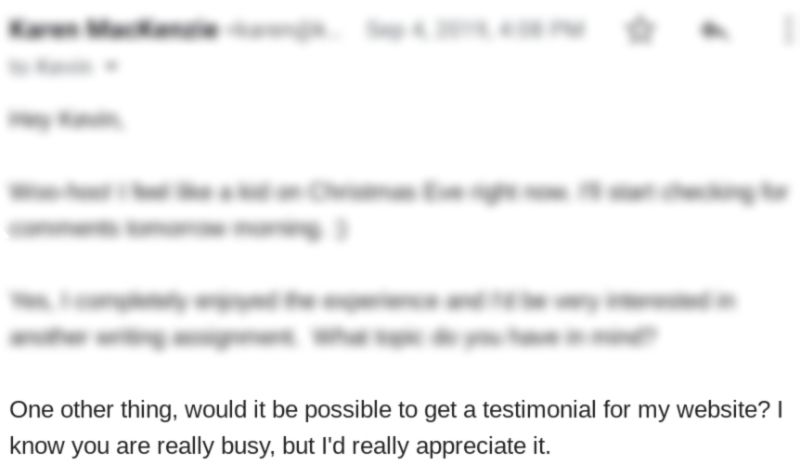
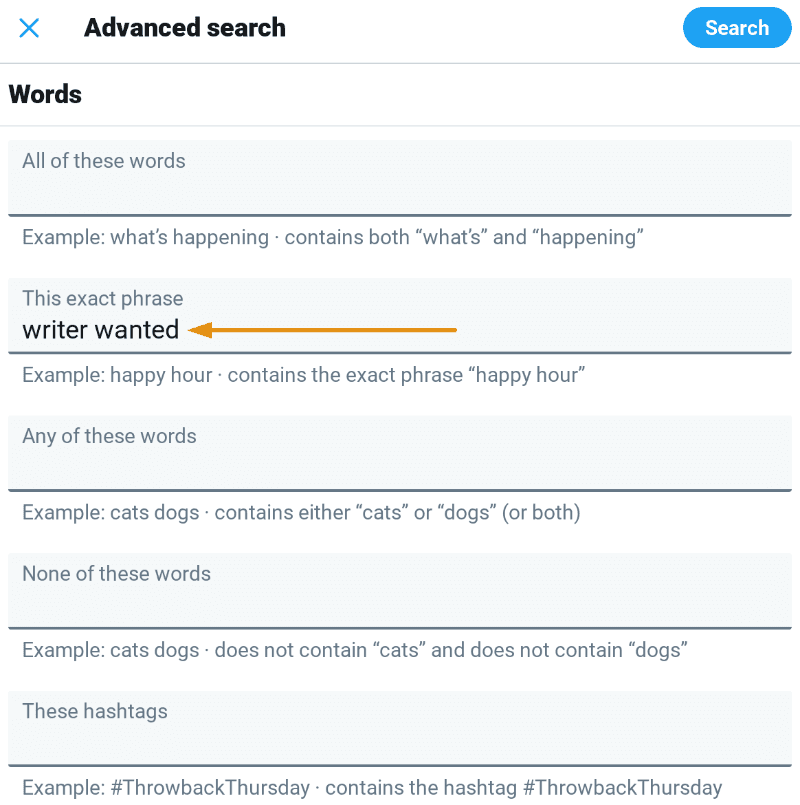




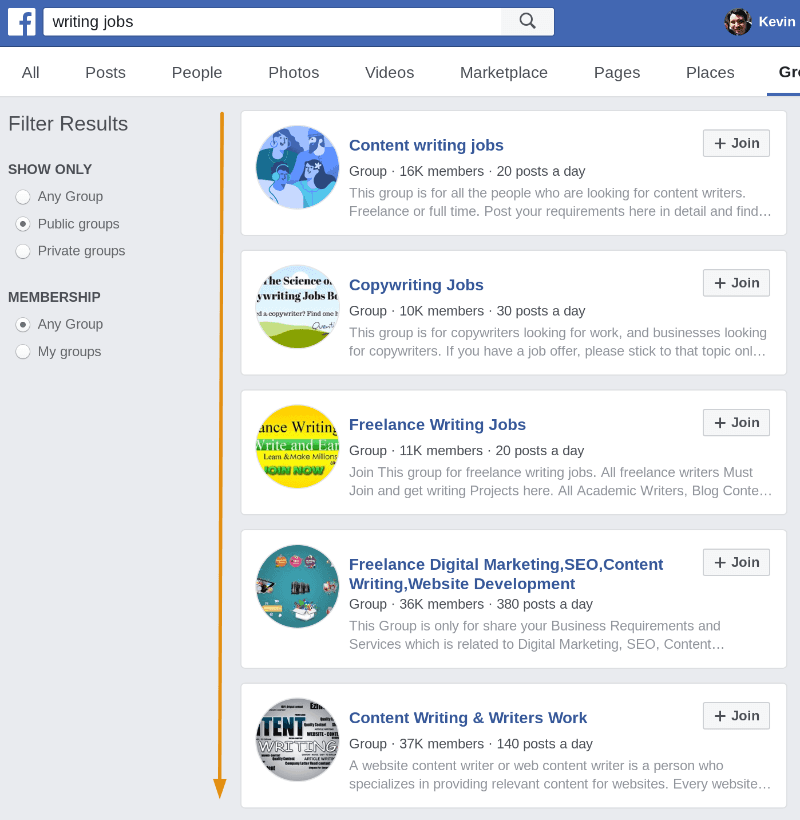
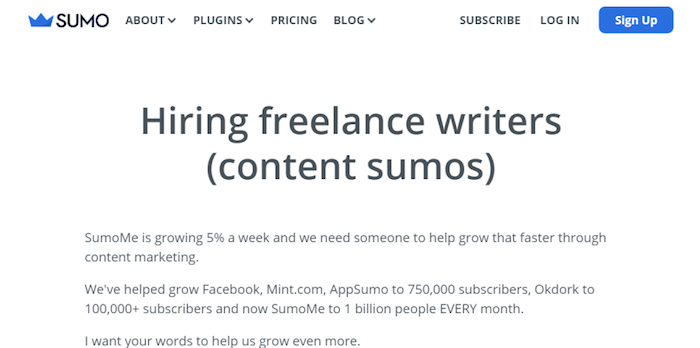
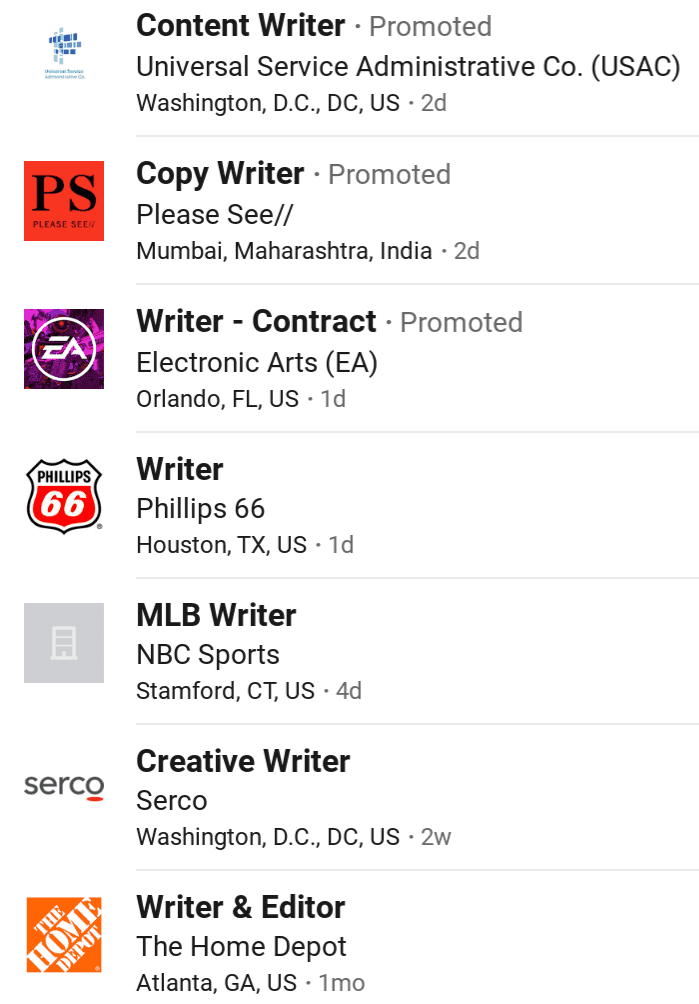
No comments:
Post a Comment